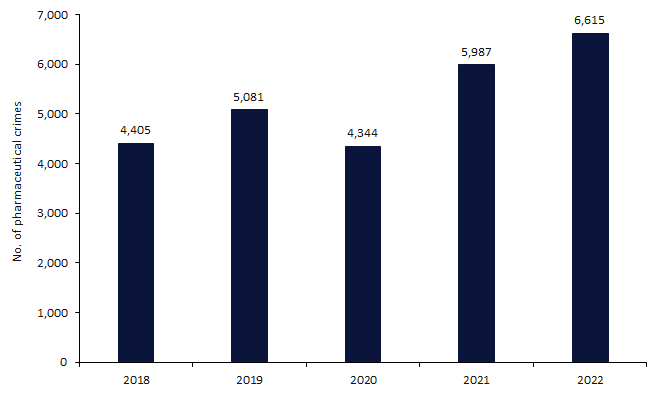
Drug counterfeiting is rising globally, especially in emerging markets. Now weight loss drugs are being targeted by counterfeiters, causing a surge in global crime. These drugs include the diabetic treatments Novo Nordisk’s (Bagsvaerd, Denmark) Wegovy and Ozempic, and Eli Lilly’s (Indianapolis, IN, US) Mounjaro.
A review in Forensic Science International entitled ‘Trends in counterfeit drugs and pharmaceuticals before and during the Covid-19 pandemic (2022)’ reported that antibiotics, painkillers, and “lifestyle expensive pharmaceuticals like hormones, steroids, anorectics, erectile dysfunction drugs and psychotropic drugs” were among the most targeted by counterfeiters. During the Covid-19 pandemic, commonly counterfeited products included antiviral medications, antimalarial chloroquine, and vitamin C.
There is no universally accepted definition for a counterfeit medicine. However, the World Health Organization (WHO) uses labels such as substandard, falsely labelled, falsified, and counterfeit to characterise medicines that are forged to appear authentic. Both generic and innovator medicines can be falsified, ranging from expensive products for oncology to inexpensive products such as analgesics. These drugs may cause harm to patients and fail to treat the diseases for which they were intended. Some fake medicines have been found to contain mercury, arsenic, rat poison, or cement.
Figure 1 (above) shows that the incidence of drug counterfeiting is on the rise. There were 6,615 pharmaceutical crime incidents in 2022, an increase of 10% compared to 2021. All regions covered experienced an increase in incidents in 2022, which included 1,738 incidents in Asia-Pacific, 934 in Latin America, and 185 in Africa. Direct region-to-region comparisons can be complicated due to competing law enforcement priorities, lack of funding, or inadequate regulatory structures in certain regions of the world. As a result, counterfeit drugs can often go unnoticed.
Asia-Pacific had the largest number of arrests (4,172 people) for counterfeiting, illegally diverting, or stealing drugs in 2022, an increase of 42% compared to 2021 for the region.
See Also:
The WHO estimates that the share of counterfeit and poor-quality drugs on the market ranges from over 10% of total sales in low-income and middle-income countries to 1% in developed countries. Demand for weight loss drugs such as Ozempic is leading to a wave of lifestyle medicine counterfeiting not seen since Viagra.
How well do you really know your competitors?
Access the most comprehensive Company Profiles on the market, powered by GlobalData. Save hours of research. Gain competitive edge.

Thank you!
Your download email will arrive shortly
Not ready to buy yet? Download a free sample
We are confident about the unique quality of our Company Profiles. However, we want you to make the most beneficial decision for your business, so we offer a free sample that you can download by submitting the below form
By GlobalDataOn 8 November 2023, Brazil’s regulatory authority Agência Nacional de Vigilância Sanitária (Anvisa) issued a warning to the Brazilian population and health professionals about the counterfeit versions of Biogen’s (Cambridge, MA, US) Tysabri (a monoclonal antibody for treating Crohn’s disease and multiple sclerosis) and Novo’s Ozempic.
On 13 September 2023, Mexico’s Federal Commission for the Protection against Health Risks (COFEPRIS) issued an alert highlighting falsified hepatitis B vaccines (HBV) in the country. COFEPRIS issued more than 30 separate alerts for allegedly falsified, mislabeled, or otherwise adulterated medicines during H1 2023. The jury is still out on whether this high rate of detection is primarily due to improvements in pharmacovigilance in Mexico or an expansion of black-market sales.
Colombia’s National Food and Drug Surveillance Institute (INVIMA) has released monthly reports highlighting alerts regarding fraudulent medicines. A total of 35 alerts were issued in May alone. While most alerts issued relate to consumer-targeted dietary supplements and the like, several relate to certain batches of innovative drugs, including fraudulent batches of oncology biologic drugs such as Bristol Myers Squibb’s (Princeton, NJ, US) Yervoy and Opdivo, as well as Roche’s (Basel, Switzerland) MabThera, among others.
On 6 February 2023, a report by the United Nations Office on Drugs and Crime (UNODC) claimed that counterfeit medicines in sub-Saharan Africa could be responsible for nearly 500,000 deaths per year. The WHO estimates that providing medical care to people in sub-Saharan Africa who have used falsified or substandard malaria products costs between $12m and $45m every year.
On 1 April 2022, a report from the non-profit anti-counterfeit organisation Authentication Solutions Providers’ Association (ASPA) found that sub-standard and falsified medical products increased by almost 47% in India. India is a key global producer of counterfeit medications; despite efforts to tackle the manufacture of spurious medications through the implementation of QR codes on API containers since January 2023, the issue remains endemic.






Related Company Profiles
Bristol-Myers Squibb Co
Eli Lilly and Co
Novo Nordisk AS
Biogen Inc